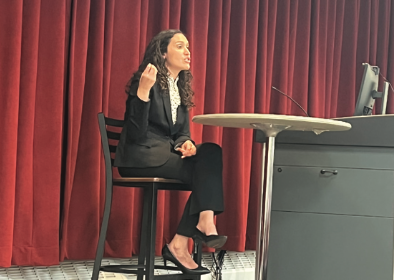
State Supreme Court nominee holds discussion with students
By Amethyst Martinez
Rachel Wainer Apter, Director of the New Jersey Division of Civil Rights and New Jersey Supreme Court nominee, joined Rider students and faculty for an open discussion in the Rue Auditorium on March 24.
Apter came to Rider to talk about civil rights, a topic at the forefront of American politics and discussion. Micah Rasmussen, director of the Rebovich Institute for New Jersey Politics, organized and led the discussion. Andrew Bernstein, a junior political science major, introduced Apter, as he is currently interning at her office.
After graduating from Harvard Law School, Apter worked as a law clerk for former Supreme Court Justice Ruth Bader Ginsberg, Judge Robert Katzmann on the United States Court of Appeals for the Second Circuit and Judge Jed Rakoff on the United States District Court for the Southern District of New York.
Apter, now a New Jersey Supreme Court nominee by Gov. Phil Murphy, became the Director of the New Jersey Division of Civil Rights in 2018 after working as the Counsel to the Attorney General, advising on civil rights and immigration issues. Apter also worked for the American Civil Liberties Union (ACLU) on cases involving discrimination.
Rasmussen said, “One of the things I’ve noticed this semester and this year is that politically-minded students on campus are very interested in talking about civil rights and civil liberties. … Rachel is on the front lines of that. She is the one whose office steps in when the state believes that somebody has been discriminated against.”
Apter first discussed her career in civil rights, as well as law clerking with judges like Bader Ginsberg.
“[Bader Ginsberg] was a really wonderful mentor and support and source of inspiration for many years,” said Apter. “She took words very seriously. … Justice Ginsberg really believed in the power of language.”
She also continued to talk about her working experience for the American Civil Liberties Union (ACLU) for five months, and why she left after such a short period of time.
“I met with [Attorney General Gurbir Grewal] and he said, ‘I would like you to come on and figure out how civil rights work should work in New Jersey.’ And so I thought that was an incredible opportunity that I could not say no to. I ended up leaving the ACLU after five months, and it was very sad because it was a wonderful experience,” said Apter.
Apter also explained how the New Jersey Division of Civil Rights functions and what kind of work her team does.
“The division is an administrative body where people who feel that they have been the victim of discrimination or bias-based harassment, either in employment, housing or public accommodations, can file individual complaints, so they don’t need a lawyer. … We have a team of neutral investigators who investigate cases, and if we conclude at the end of the investigation that we think discrimination did occur, then we will prosecute the violation, either in court or in the Office of Administrative Law,” said Apter. The division also can reach settlements.
After Apter offered background information about her career and the work she does, students and faculty were able to ask questions in an open discussion.
Rowan Mickley, freshman elementary education major, asked multiple questions about civil rights to Apter.
“I felt like she was really helpful in addressing what I had to say,” said Mickley. The discussion led to a more in-depth look at civil rights laws in New Jersey. Apter said, “I think it’s very important for there to be strong enforcement of civil rights laws both on a federal and state level. But, as I mentioned, New Jersey law is much more protective than federal law on a whole host of different issues.” Wrapping up the conversation, Apter spoke about her nomination for the New Jersey Supreme Court.
“If I were lucky enough to be confirmed — I am 41 now, I will be turning 42 at some point soon — I would have many years to be able to serve the people of New Jersey, and I would feel incredibly grateful for that,” said Apter.
Bernstein said, “Rachel Wainer Apter was so important for students to hear from because she’s talking about something that affects the lives of everybody, of students from all backgrounds, and her expertise is unparalleled. … She’s a brilliant legal mind. To hear from her about what is being done [about] civil rights in New Jersey and what can still be done is, I think, a really impactful discussion for a lot of students. It touches upon something that is meaningful to people’s lives.”


